| European Enlightenment Printable Outline |
|---|
| www.studenthandouts.com ↣ World History ↣ Enlightenment ↣ Enlightenment Outlines & PPTs |
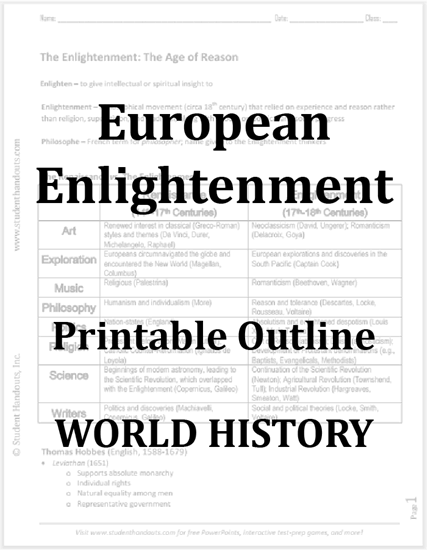 |
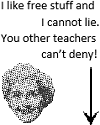 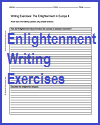 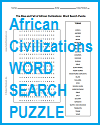 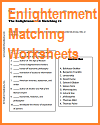 |
|
Click here to print this outline. It is four pages in length, so prints on two double-sided sheets.
Enlighten — to give intellectual or spiritual insight to Enlightenment — Philosophical movement (circa 18th century) that relied on experience and reason rather than religion, superstition, and tradition, along with a focus on political and social progress Philosophe — French term for philosopher; name given to the Enlightenment thinkers The Renaissance vs. The Enlightenment • Renaissance (14th-17th Centuries) • Enlightenment (17th-18th Centuries) Art • Renewed interest in classical (Greco-Roman) styles and themes (Da Vinci, Durer, Michelangelo, Raphael) • Neoclassicism (David, Ungerer); Romanticism (Delacroix, Goya) Exploration • Europeans circumnavigated the globe and encountered the New World (Magellan, Columbus) • European explorations and discoveries in the South Pacific (Captain Cook) Music • Religious (Palestrina) Romanticism (Beethoven, Wagner) Philosophy • Humanism and individualism (More) Reason and tolerance (Descartes, Locke, Rousseau, Voltaire) Politics • Nation-states (England) Absolutism and enlightened despotism (Louis XIV, Maria Teresa) Religion • Protestant Reformation (Martin Luther); Catholic Counter-Reformation (Ignatius de Loyola) • Cult of Reason (atheism); Deism (agnosticism); • Development of Protestant denominations (e.g., Baptists, Evangelicals, Methodists) Science • Beginnings of modern astronomy, leading to the Scientific Revolution, which overlapped with the Enlightenment (Copernicus, Galileo) • Continuation of the Scientific Revolution (Newton); Agricultural Revolution (Townshend, Tull); Industrial Revolution (Hargreaves, Smeaton, Watt) Writers • Politics and discoveries (Machiavelli, Copernicus, Galileo) • Social and political theories (Locke, Smith, Voltaire) Thomas Hobbes (English, 1588-1679) • Leviathan (1651) • Supports absolute monarchy • Individual rights • Natural equality among men • Representative government René Descartes (French, 1596-1650) • Known as the "Father of Modern Philosophy" • Discourse on the Method of Rightly Conducting One's Reason and of Seeking Truth in the Sciences (1637) • "I think, therefore I am" • Cogito ergo sum (Latin) • Je pense, donc je suis (French) John Locke (English, 1632-1704) • "Father of Liberalism" • Fundamental Constitutions of Carolina (1669) • Early attempt at a degree of self-government in American colonies • Largely abandoned by 1700 • A Letter Concerning Toleration (1689) • Supports religious toleration • Toleration prevents civil unrest • Two Treatises of Government (1689) • Natural rights — Understood by rational people as the rights people are born with • Social contract — People come together to create laws that will govern them o Mankind has a natural right to defend "life, liberty, health, and property" • Origin of Declaration of Independence's "life, liberty, and pursuit of happiness" • An Essay Concerning Human Understanding (1690) • Person is a tabula rasa (blank slate) at birth • Knowledge filled in through experience • Some Thoughts Concerning Education (1693) • Child's mind is a tabula rasa (blank slate) • Good education creates good people • Leading English text on education for circa 100 years • The Reasonableness of Christianity, as Delivered in the Scriptures (1695) • Idea that Christian truths can be understood by a reasonable person reading the Bible George Berkeley (Anglo-Irish, 1685-1753) • "Esse est percipi"--"To be is to be perceived" • Philosophy that ideas must be perceived in order to exist • Helped to develop calculus Baron de Montesquieu (French, 1689-1755) • The Spirit of the Laws (1748) • Separation of powers Voltaire (French, 1694-1778) • Published multiple works, including Candide (1759) • Advocated civil liberties (fair trial and freedom of religion) and enlightened despotism • Thought that democracy propagated the idiocy of the masses • Criticized the Catholic Church, Old Regime, anti-Semitism, and slavery • Drank 30 cups of coffee per day David Hume (Scottish, 1711-1776) • A Treatise of Human Nature (1739) • Looks at the psychological basis of human nature • Belief, not reason, governs human behavior Jean-Jacques Rousseau (French, 1712-1778) • Controversial writer • Discourse on the Arts and Sciences (1750) • Arts and sciences corrupt human morality (controversial) • Prefers a state of nature over society • Emile: or, an Education (1762) • "...Everything degenerates in the hands of man." • Nature over society/civilization • Emile is about a fictional boy (Emile) and girl (Sophie) raised in a state of nature • "In what they have in common, they are equal. Where they differ, they are not comparable. A perfect woman and a perfect man ought not to resemble each other in mind any more than in looks, and perfection is not susceptible of more or less. In the union of the sexes each contributes equally to the common aim, but not in the same way. From this diversity arises the first assignable difference in the moral relations of the two sexes. One ought to be active and strong, the other passive and weak. One must necessarily will and be able; it suffices that the other put up little resistance. Once this principle is established, it follows that woman is made specially to please man." • The Social Contract, or Principles of Political Right (1762) • Denied divine right of kings • Free will — Man must be free to enter and exit contracts • Man leaves his state of nature to enter into a social contract with others • "Man is born free, and everywhere he is in chains. "THE Sovereign, having no force other than the legislative power, acts only by means of the laws; and the laws being solely the authentic acts of the general will, the Sovereign cannot act when the people is assembled. "Every law the people has not ratified in person is null and void—is, in fact, not a law. "The legislative power belongs to the people, and can belong to it alone." Denis Diderot (French, 1713-1784) • Encyclopedia (1750-1765) • Collection of existing knowledge and new ideas Adam Smith (Scottish, 1723-1790) • An Inquiry into the Nature and Causes of the Wealth of Nations (1776) • Laissez-faire ("hands-off") economics • Invisible hand guides the market Immanuel Kant (Prussian, 1724-1804) • "Answering the Question: What Is Enlightenment?" (1784) • Enlightenment is an era shaped by the Latin motto Sapere aude ("Dare to know") • The Critique of Pure Reason (1781) • Deals with metaphysics (nature of being) and epistemology (nature and scope of knowledge) Cesare Beccaria (Italian, 1738-1794) • On Crimes and Punishments (1764) • Condemned death penalty and torture • Prison reform — Rehabilitation rather than punishment Mary Wollstonecraft (English, 1759-1797) • A founding feminist philosopher • A Vindication of the Rights of Woman (1792) • Women are not inferior to men • Women lack the education that men receive |
| Enlightenment Books and Films | Enlightenment Outlines and PowerPoints |
| Enlightenment Study Games | Enlightenment Maps and Pictures |
| Enlightenment Miscellany | Enlightenment Worksheets |
| www.studenthandouts.com ↣ World History ↣ Enlightenment ↣ Enlightenment Outlines & PPTs |








